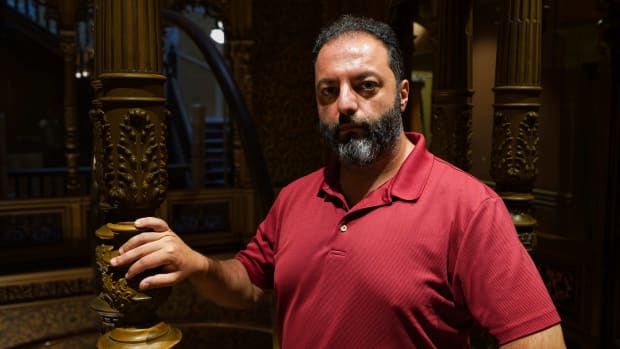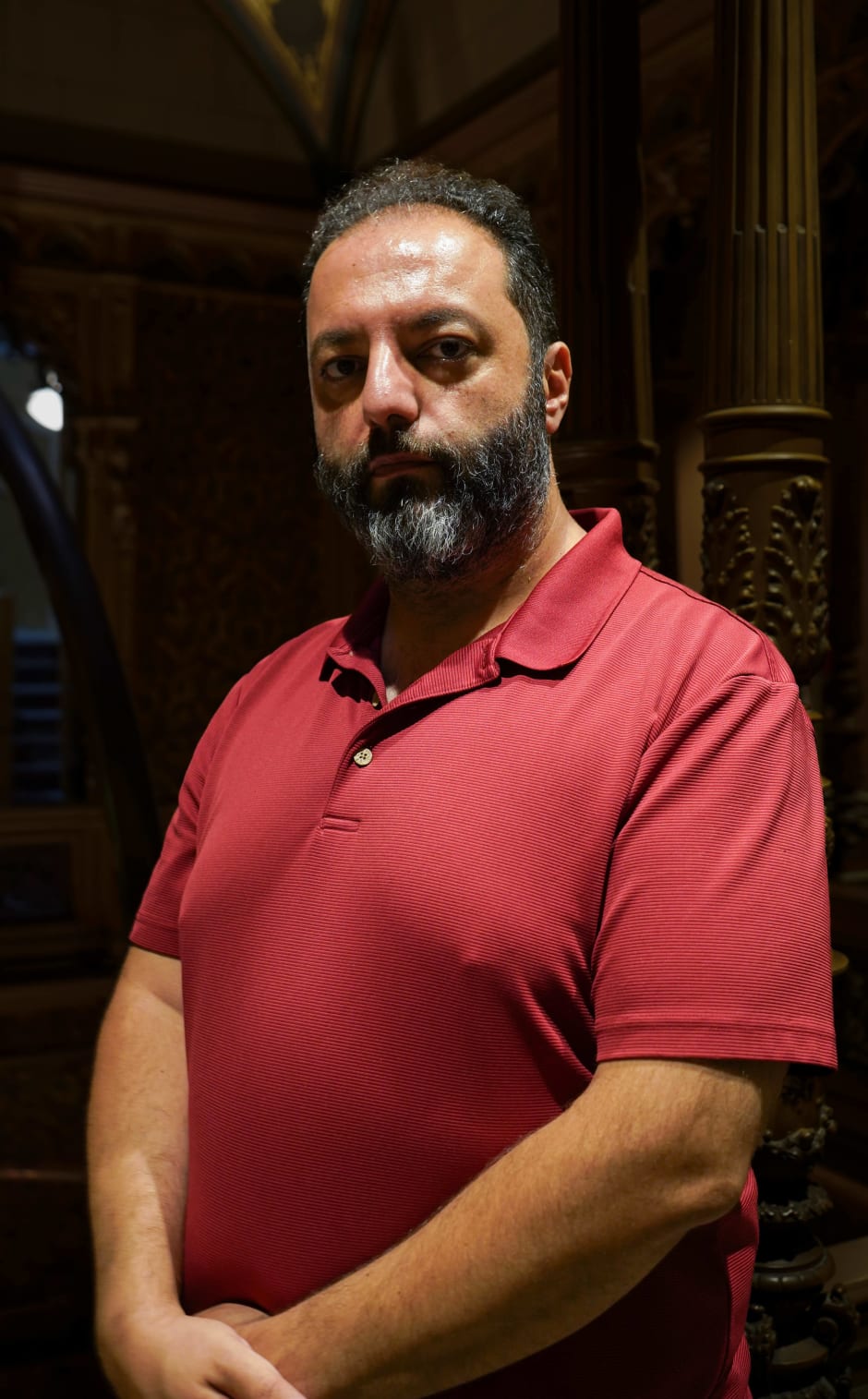
UvA professor Uğur Üngör: “No difference between genocide and genocidal violence”
Professor Uğur Üngör calls the destruction wrought by Israel in Gaza a clear case of genocide. Genocide expert Üngör observes that most historians in his field now agree on one thing: “Israel has escalated its violence against Palestinians in a genocidal process.”
A war against Hamas, an escalated conflict, mass murder, crimes against humanity, genocidal violence or genocide: quite a few terms have been used to describe the situation in Gaza. Uğur Üngör, professor of Holocaust and Genocide Studies at the University of Amsterdam (UvA) and affiliated with the NIOD Institute for War, Peace and Justice, has been using the term ‘genocide’ for over a year. And now, according to Üngör, most historians agree with him: Israel is engaged in a genocidal process in Gaza.
The rector of the UvA, Peter Paul Verbeek, told Folia that he would follow the NIOD and not speak of genocide but of “genocidal violence”. Is that logical?
“It seems impossible to me to find something “genocidal” but not genocide. That’s a bit like saying, “He committed a suicidal act, but he didn’t commit suicide”. I don’t see any difference between the two terms. And I don’t hear other experts who use the adjective “genocidal” but don’t talk about genocide. Saying only “genocidal violence” seems to me to be an excuse for not having to use genocide.”
Üngör argues that historians generally define genocide as “a large-scale attack on a group of people because of their social identity”. There is also a legal definition of genocide, which is used in court cases against alleged perpetrators of genocide. That definition, laid down in the 1948 UN Charter, states that genocide is committed “with intent to destroy, in whole or in part, a national, ethnic, religious or racial group.”.
According to Üngor, this definition was drawn up with the outdated interests and views of powerful states at the time, such as the United States and the Soviet Union. He argues that, for example, the categorisation of “national, ethnic, religious” is too limited for how researchers now view the term “genocide”.
However, NIOD director Martijn Eickhoff in NRC only referred to “genocidal violence”. Does your statement as a NIOD researcher mean that the NIOD has different lines of thinking?
“Of course, we may have different interpretations within the NIOD; that is part of free research. For me, “genocidal violence” still means that “genocide” is taking place. And I don’t think my boss Martijn sees it any differently.”
“However, we sometimes prefer to use terms such as “genocidal violence” or – as I often say – “a genocidal process” rather than “genocide”. This is because the term “genocide” is often associated with the genocide article in the 1948 UN Charter, which can be used in court cases. Historians cannot say much about the strict legal provability of such an article and do not want to give that impression to the public. That is why we sometimes use other terms. But in my opinion, in a non-legal but purely historical context, the term “genocide” is certainly appropriate.”
What made you decide that genocide is taking place in Gaza?
“In my opinion, genocide is not a single event. It is not a light switch that is turned on with one death, one murder, one bomb. It is a dimmer switch: a process that is slowly turned up and then gradually becomes genocidal. A kind of slow-motion genocide is taking place against Palestinians, with their social identity being attacked time and again. For years, they have been slowly harassed, driven out and murdered.”
“For me, however, there were several points in the escalation of violence, in the turning up of that dimmer switch. It started early after the Hamas attack in October 2023: with the bombing of entire apartment buildings if even one person suspected of being a member of Hamas was believed to be inside. No warning, just a hundred people killed in one fell swoop.”

Such bombing may be a war crime, but that does not necessarily constitute ethnic cleansing, does it?
“If it were a one-off atrocity, perhaps not. But this did not happen once, twice, or ten times; at least forty such apartment buildings were razed to the ground out of nowhere. At a certain point, it becomes impossible for a people to continue living in the area, and that is a characteristic of genocide.”
“Moreover, Israel does not stop there. The clearest evidence of genocide, the direct attack on the social group, is currently the blocking of trucks carrying aid supplies. Netanyahu's government is creating a famine. Cars carrying medicines are being held up, fishing in the sea is being made impossible and aid supplies are being set on fire by the Israeli army.”
“In addition, universities have been deliberately destroyed, historical heritage has been destroyed and even an IVF clinic has been razed to the ground with explosives: which Palestinian can ever return when there is nothing left to live for? This makes it impossible to preserve your social identity.”
Some people will argue: “Israel has no choice, because Hamas is hiding behind civilian targets.”
“Of course Hamas is operating in urban areas. You will see this with most insurgents and guerrilla movements throughout history: they stay in populated areas. Outside the city, Hamas soldiers are completely vulnerable to Israel’s precision bombing. According to humanitarian law, the question is whether Israel has no other means at its disposal in the war against Hamas. Israel does: it has precision missiles and, above all, a huge amount of information about its enemy. You don’t have to raze an entire country, an entire population, to attack that one group.”
Nevertheless, Hamas also commits war crimes: now, for example, they themselves appear to be withholding aid.
“The crimes of Hamas – such as withholding food – do not justify Israel committing genocide. We are dealing here with an all-powerful state – Israel – which is supposedly killing an entire population in order to destroy a militarily inferior group – Hamas. Israeli soldiers are capturing ordinary boys on the streets, torturing them and murdering them. A Hamas fighter is not going to be selling falafel on the street. But the Israeli army arrests, tortures and kills the falafel seller just as easily.”
How can you be so sure? Is there any proof?
“Firstly, there are thousands of images. I follow Israeli soldiers who openly express their intention to kill Gazans on Instagram, Facebook and TikTok, posing with Palestinian women's underwear to humiliate them and proudly talking about the crimes they commit. And then there are the images of bombings, torture and murders. Or UN footage of burned aid supplies and aid trucks brought to a standstill.”
“Yet I believe most in eyewitness accounts. If one person says that his grandmother was shot dead, that could be out of hatred for Israel. But if thousands of Palestinians say that their grandparents, pets and children were shot for no reason, I cannot believe that they are all making it up out of pure hatred for Israel. Moreover, the idea that hatred of Israel would mean that people can no longer testify honestly is rather racist. I mean, did we question statements about the German occupiers in diaries written by Dutch people during the Second World War purely because the Dutch hated the Germans?”
“And even if you did that, and don’t want to believe the Palestinians, then go sit in a pub in Tel Aviv with some veterans. They’ll tell you how their commanders ordered them to shoot every Palestinian they saw, or to bomb indiscriminately regardless of civilian casualties. There are now NGOs in Israel collecting such statements and they have spoken to more than enough veterans to speak of genocide.”
However, no legal institution, such as the International Court of Justice, has yet declared that genocide is taking place.
“Of course we don’t have to wait for the lawyers. That would make us completely dependent on whether a court case is brought to determine whether genocide has been committed. Genocides that have never been tried in a tribunal – such as in Indonesia in 1965, the genocide of the Maya in Guatemala in the 1980s and the current genocide of Uyghurs in China – should not be called genocide. Moreover, lawyers focus only on individual facts that are important for their case, whereas we as historians see the bigger picture.”
Has it ever proved useful to sever academic ties with a country that has committed genocide, such as Israel, in your opinion?
‘That seems like a good topic for research. A student should look into that for their master's thesis.’


